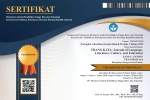Peer Review Process
The publication of articles in TRANS-KATA: Journal of Language, Literature, Culture, and Education is determined based on the scientific validity and coherence of the content, as evaluated by our editors and/or peer reviewers. They also assess the clarity of the writing and the significance of the work to the field. TRANS-KATA: Journal of Language, Literature, Culture, and Education appreciates and values the contributions and recommendations provided by its reviewers.
Initial Evaluation of Manuscripts
The initial stage of the manuscript submission process involves a thorough evaluation by the Editor. While uncommon, it is possible for an exceptional manuscript to be accepted during this stage. Manuscripts that do not meet the criteria of originality, exhibit significant scientific deficiencies or fall outside the aims and scope of TRANS-KATA: Journal of Language, Literature, Culture, and Education are rejected. However, those manuscripts that meet the minimum requirements are subsequently subjected to expert peer review.
Type of Peer Review
The submitted manuscripts in TRANS-KATA: Journal of Language, Literature, Culture, and Education typically undergo a rigorous peer review process. Two to three expert reviewers are invited to assess the scientific rigor and coherence of the manuscript. It is important to note that the review process follows a double-blind methodology, ensuring anonymity for both the authors and reviewers throughout the evaluation process.
Reviewer Evaluation Guidelines
Reviewers are asked to consider the article’s scholarly merit based on the following criteria:
1) Originality of the Research Issue and/or Methodology: Assess the novelty and uniqueness of the research question and the approach used.
2) Adequacy and Rigor of the Research Methodology and Techniques Used: Evaluate the appropriateness and thoroughness of the methods and techniques applied in the research.
3) Quality and Rigor of Data Analysis: Analyze the depth and accuracy of the data analysis performed.
4) Comprehensiveness of the Literature Review: Consider the extent to which the literature review covers relevant and recent research in the field.
5) Readability and Presentation of the Article: Judge the clarity, organization, and presentation of the manuscript.
Reviewers should provide detailed and specific comments on all these items. Where appropriate, reviewers are encouraged to offer suggestions for revision to enhance the manuscript's quality.
Decision
The reviewers play a crucial role in providing their expert assessments and recommendations to the Editor. Their evaluations guide the Editor in making the final decision regarding the acceptance or rejection of the article. The Editor carefully considers the reviewers' reports and, if required, may consult with members of the Editorial Board to reach a well-informed decision. It is important to note that the Editor's decision is considered final and binding.




